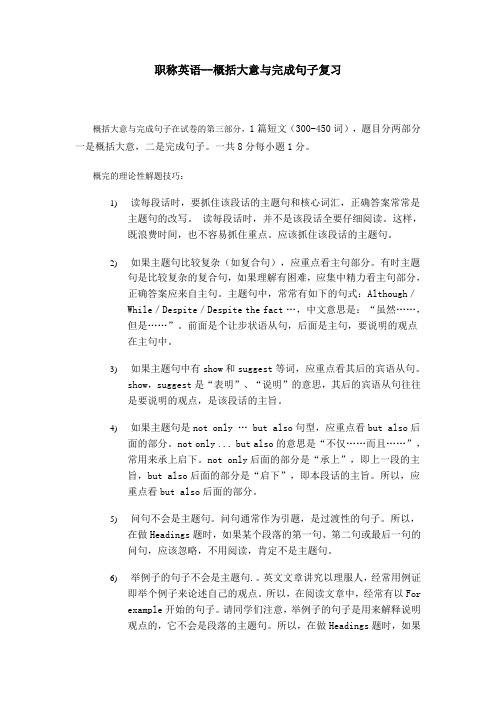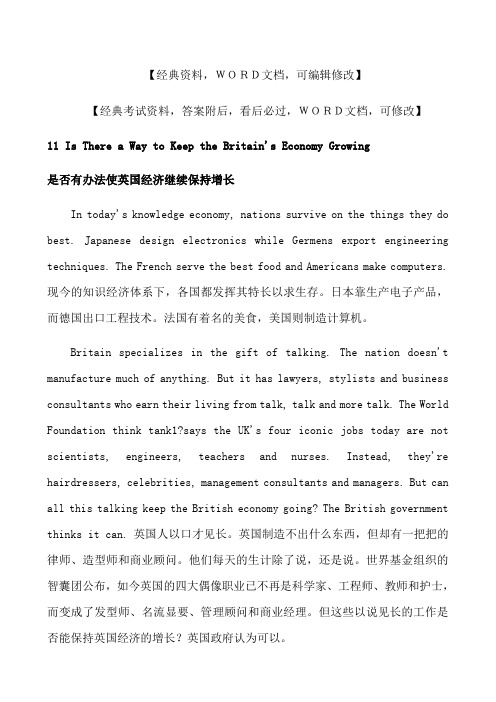职称英语考试资料——概括大意完成句子
职称英语--概括大意与完成句子复习

职称英语--概括大意与完成句子复习概括大意与完成句子在试卷的第三部分,1篇短文(300-450词),题目分两部分一是概括大意,二是完成句子。
一共8分每小题1分。
概完的理论性解题技巧:1)读每段话时,要抓住该段话的主题句和核心词汇,正确答案常常是主题句的改写。
读每段话时,并不是该段话全要仔细阅读。
这样,既浪费时间,也不容易抓住重点。
应该抓住该段话的主题句。
2)如果主题句比较复杂(如复合句),应重点看主句部分。
有时主题句是比较复杂的复合句,如果理解有困难,应集中精力看主句部分,正确答案应来自主句。
主题句中,常常有如下的句式:Although/While/Despite/Despite the fact …,中文意思是:“虽然……,但是……”。
前面是个让步状语从句,后面是主句,要说明的观点在主句中。
3)如果主题句中有show和suggest等词,应重点看其后的宾语从句。
show,suggest是“表明”、“说明”的意思,其后的宾语从句往往是要说明的观点,是该段话的主旨。
4)如果主题句是not only … but also句型,应重点看but also后面的部分。
not only ... but also的意思是“不仅……而且……”,常用来承上启下。
not only后面的部分是“承上”,即上一段的主旨,but also后面的部分是“启下”,即本段话的主旨。
所以,应重点看but also后面的部分。
5)问句不会是主题句。
问句通常作为引题,是过渡性的句子。
所以,在做Headings题时,如果某个段落的第一句、第二句或最后一句的问句,应该忽略,不用阅读,肯定不是主题句。
6)举例子的句子不会是主题句.。
英文文章讲究以理服人,经常用例证即举个例子来论述自己的观点。
所以,在阅读文章中,经常有以Forexample开始的句子。
请同学们注意,举例子的句子是用来解释说明观点的,它不会是段落的主题句。
所以,在做Headings题时,如果某个段落的第一句、第二句或最后一句是举例子的句子,应该忽略,不用阅读,肯定不是主题句。
概括大意与完成句子--职称英语考试辅导《综合类》第三部分讲义7

正保远程教育旗下品牌网站美国纽交所上市公司(NYSE:DL)职业培训教育网职业人的网上家园职称英语考试辅导《综合类》第三部分讲义7概括大意与完成句子例2:At the end of the 19th century, women’s names started ________.原文:One Australian meteorologist began giving women’s names to tropical storms at the end of the 19th century.A.to track hurricanes and issue warningsB.to avoid confusionC.to stay at homeD.to be given to tropical stormsE.to make predictionsF.to kill at least 15 people[答疑编号505916030808]【答案】D例3:The British people are _____.(2007)Fish and chips are _____.A.faster but more expensive than busesB.both ancient and modernC.humorous and hospitableD.cheap and efficientE.traditional and famousF.clever and hardworking原文:Most people have strong preconceptions about the British.But if you’re one of these people, you’d be wise to abandon those ideas.Visit a nightclub in one of the big cities, a football match or a good local pub and you might more readily describe the English people as humorous and hospitable.The UK is not famous for its food.But you still need to know some of the traditional English foods.The most famous must be fish and chips.老师手写内容:British adj.英国的,英国人的hospital n.医院hospitable adj.热情好客的[答疑编号505916030809]【答案】CE例4:China pledges herself to follow ________.(2006)The world leaders finally attended ________.A.an opening ceremonyB.61 countriesC.a wreath laying ceremonyD.the 60th anniversary of its victory over Nazi GermanyE.the road of peace and developmentF.55 million people of their lives.。
职称英语合概括大意和完成句子

【经典资料,WORD文档,可编辑修改】【经典考试资料,答案附后,看后必过,WORD文档,可修改】11 Is There a Way to Keep the Britain's Economy Growing是否有办法使英国经济继续保持增长In today's knowledge economy, nations survive on the things they do best. Japanese design electronics while Germens export engineering techniques. The French serve the best food and Americans make computers.现今的知识经济体系下,各国都发挥其特长以求生存。
日本靠生产电子产品,而德国出口工程技术。
法国有着名的美食,美国则制造计算机。
Britain specializes in the gift of talking. The nation doesn't manufacture much of anything. But it has lawyers, stylists and business consultants who earn their living from talk, talk and more talk. The World Foundation think tank1?says the UK's four iconic jobs today are not scientists, engineers, teachers and nurses. Instead, they're hairdressers, celebrities, management consultants and managers. But can all this talking keep the British economy going? The British government thinks it can.英国人以口才见长。
职称英语考试第三部分概括大意与完成句子

第3部分:概括大意与完成句子(第23-30题,每题1分,共8分)考查考生把握文章段落大意及细节的能力。
本部分为1篇300-450词的短文,有2项测试任务:(1)短文后有6个段落小标题,要求考生根据文章的内容为其中指定的4个段落各选择一个正确的小标题;(2)短文后有4个不完整的句子,要求考生在所提供的6个选项中选择4个正确选项分别完成每个句子。
概括大意与完成句子答题技巧:此部分考察对文章的理解程度,答题时可先快速浏览全文,了解全文的主旨,然后围绕主旨去分析每一段的意思,保证意思理解不会偏离主旨,这样就完成概括大意。
完成句子在于根据上下文意思,补充句子,抓住主旨,找到最贴近主旨和上下文的内容,补充即可。
How We Form First lmpression 对别人的第一印象是怎样形成的We all have first impression Of someone we just met. But why? Why do we form an opinion about Someone without really knowing anything about him or her -aside perhaps from a few remarks or readily observable traits.The answer is related to how your brain allows you to be aware of the world. Your brain is so sensitive in picking up facial traits,even very minor difference in how a person's eyes,ears,nose,or mouth are placed in relation to each other makes you see him or her as differene1.In fact,your brain continuously process incoming sensory information- the sights and sounds of your world. These incoming "signals" are compared against2 a host of "memories" stored in the brain areas called the cortex system to determine what these new signals " mean" .If you see someone you know and like at school3,your brain says "familiar and safe. " If you see someone new,it says,"new-potentially,threatening". Then your brain starts to match features of this stranger with other " known" memories. The height ,weight,dress ,ethnicity ,gestures ,and tone of voice are all matched up. The more unfamiliar the characteristics ,the more your brain may say,This is new. I don't like this person". Or else,"I'm intrigued" . Or yourbrain may perceive a new face but familiar clothes,ethnicity,gestures-like your other friends;so your brain says: "I like this person" . But these preliminary "impressions" can be deadwrong4When we stereotype people,we use a less mature form of thinking (not unlike the immature thinking of a very young child) that makes simplistic and categorical impressions of others. Rather than learn about the depth and breadth of people-their history,interest,values,strengths,and true character - we categorize them as jocks,geeks,or freaks.However,if we resist initial stereotypical impressions,we have a chance to be aware of what a person is truly like. If we spend time with a person,hear about his or her life,hopes,dreams,and become aware of the person's character,we use a different,more mature style of thinking- and the most complex areas of our cortex,which allow us to be humane.词汇:trait /trei,treit/n. 特点,特征,特性host n. 一大群,许多simplistic /sim'plistik/ adj. 过分单纯化的sensory adj. 感官的,感觉的categorical adj. 绝对的cortex n. 脑皮层Jock n. 骗子ethnicity n. 种族特点geek /gi:k / n. 反常的人intrigue /in'tri:g/ v. 激起兴趣stereotype v. 对……产生成见freak /fri:k/ n. 怪人humane /hju:'mein,hju-/ adj. 有人情味的,人文的注释:1. Your brain,is so sensitive in picking up facial traits,even very minor difference in how a person's eyes ,ears ,nose ,or mouth are placed in relation to each other makes you see him or her as different. 从even 开始到as different 是个结果状语从句,相当于that even very minor ... ,而that 是与主句中的so 呼应的。
职称英语 概括大意与完成句子

ACEinhibitors suppress a protein called angiotensin-converting enzyme, or ACE.
This enzyme producesa chemical in the body that makes blood passages narrow.
估测了女性的辐射累积剂量之后,他们用两种模型计算这可能导致的额外的癌症数量。
polytechnic多工艺的
analyse分析
estimate估计,预测
cumulative dose累计剂量
calculate 计算
4.The mathematical model recommended by Britain’s NationalRadiologicalProtection Board(NRPB) predicted that the screening programme would cause 36 cancers per 100,000 women, 18of them fatal.
研究人员表示,患高血压的孕妇在妊娠期的前3个月服用其他降压药,她们的危险性并没有增加。
来自田纳西州的范德比特大学和波士顿大学的研究人员对此进行了研究。
《新英格兰医学杂志》发表了此项研究成果。
研究人员研究了从1985年至2000年出生的约3万新生儿的记录。
其中有209个新生儿的母亲曾经在妊娠期的前3个月里服用过ACE抑制剂。
【经典资料,WORD文档,可编辑修改】
【经典考试资料,答案附后,看后必过,WORD文档,可修改】
职称英语复习第三部分概括大意和完成句子附翻译

第三部分概括大意和完成句子阅读下面的短文,每篇短文后有两项测试任务(1)第1~4题要求从所给的6个选项中为指定的四段每段选择1个正确的小标题;(2)第5~8题要求从所给的6个选项中选择4个正确选项,分别完成每个句子。
第十一篇The Tiniest Electric Motor in the World1 Scientists recently made public the tiniest electric motor ever1 built. You could stuff hundreds of them into the period at the end of this sentence. One day a similar engine might power a tiny mechanical doctor that would travel through your body to remove your disease.2 The motor works by shuffling atoms between two molten metal droplets in a carbon nanotube. One droplet is even smaller than the other. When a small electric current is applied to the droplets, atoms slowly get out of the larger droplet and join the smaller one. The small droplet grows — but never gets as big as the other droplet — and eventually bumps into the large droplet. As they touch, the large droplet rapidly sops up the atoms it had previously lost. This quick shift in energy produces a power stroke2.3 The technique exploits the fact that surface tension — the tendency of atoms or molecules to resist separating — becomes more important at small scales3. Surface tension is the same thing that allows some insects to walk on water.4 Although the amount of energy produced is small — 20 microwatt s — it is quite impressive in relation to the tiny scale of the motor4. The whole setup5 is less than 200 nanometers on a side, or hundreds of times smaller than the width of a human hair. If it could be scaled up to the size of an automobile engine6, it would be too million time s more powerful than a Toyota Camry’s 225 horsepower V6 engine.5 In 1988, Professor Richard Muller and colleagues made the first operating micromotor, which was 100 microns across7, or about the thickness of a human hair. In 2003, Zettl’s group created the first nanoscale motor. In 2006, they built a nanoconveyor, which moves tiny particles along like cars in a factory.6 Nanotechnology engineers try to mimic nature, building things atom-by-atom. Among other things, nanomotors could be used in optical circuits to redirect light, a process called optical switching. Futurists envision a day when nanomachines, powered by nanomotors, travel inside your body to find disease and repair damaged cells.词汇: shuffle /5FQfl/v.来回运动nanometer /5neinE7mi:tE/n.纳米,毫微米molten /5mEultEn/adj.熔化的micromotor n.微电机droplet /5drCplit/n.小滴nanotube n.纳米管roycvnoconan n.纳米传送带nanotechnology n.纳米技术bump /bQmp/v.碰撞mimic / 5mimik/n.模仿sop /sCp/v.吸入stroke /strEuk/n.行程,冲积microwatt /5maikrEuwCt/n.微瓦nanomotor n.纳米发动机nanomachine n.纳米机器注释:1. ever:比以往任何时候,曾经。
职称英语考试技巧:概括大意与完成句子解题步骤

职称英语考试概括大意与完成句子解题步骤一、概括大意职称英语考试概括大意题型要求:文章由若干段组成,要求给每段找一个小标题。
小标题即该段的段落大意、中心思想、主旨。
本题型不是要求写出每段话的小标题,这样不好评判对错,而是要求从选项列表中选择。
概括大意题型以选择题的形式出现,避免了考生答题的盲目性和阅卷人员在阅卷过程中由于某些主观因素而产生的错误、误差,从而增进了考试的可信度。
在现在的考试中,选项的数目往往多余要求加小标题的段落数,也就是说,有若干个干扰选项。
(一)概括短文大意的解题步骤由于这种题型比较新颖,对多数考生来说可能有点不适应,不知如何下手。
其实,这种题型相对来说不算难。
概括大意题型的实质是让考生给每段文字“命”一个小标题。
而要“命”车这个标题就必须确定每段文字的主题思想。
如何确定文章的主题思想?考虑一下人们的写作和逻辑思维过程,这个问题就容易回答了。
我们在写一篇短文时,总要分几个段落来写,而每个段落都有自己的一个观点、论点或主旨。
要阐述它,作者就必须展开他的观点或论点,一定要作补充、说明、解释或举例,以支持所提出的问题。
反映作者观点、论点或主旨的句子通常叫主题句。
主题句往往体现了每一段或整个文章的主题思想。
那么,找到了段落的主题就抓住了它的主题思想,标题就容易确定了。
看来,要概括出每段的段落大意,就必须先找到每段的主题句。
每个选项最多只能用一次,也就是说,两个段落的小标题不可能是同一个选项。
这是因为不同段落的主旨肯定是不同的,原文将它们分为不同的段落,就是要分别说明不同的内容。
如果两段的主旨相同,即表达的中心思想一致,应该将它们合为一段,就没有必要分为两段了。
1.不要先看选项,而要从文章入手,读一段话就做一道题。
先不要看选项,而要先读文章。
读文章的时候,不要一下把文章读完,而是读一段话,做一道题。
这样做,不仅速度快,而且准确率高。
先看大标题,然后仔细阅读每段文字,理解段落的首句及尾句,尽量找到段落的主题句。
职称英语概括大意和完成句子题答题技巧

职称英语概括大意和完成句子题答题技巧1. 出题思路书内共编写15篇短文,每篇下面都分成两个部分:一是概括大意;二是完成句子。
每小题1分,共8分。
概括大意:要求对四个指定的段落作出概括,从给出的A-F六项中挑选出你认为正确的一项来概括某一段落。
有两项属于干扰项。
其目的是考核学员对指定段落的理解和概括能力。
完成句子:给出4个不完整的句子,要求从A-F六项中挑出你认为正确的一项补充到某一句中,使其合乎逻辑,通顺达意。
有两个干扰项。
其目的是考核学员队语法结构及逻辑关系的理解能力。
2. 解题步骤概括大意部分:(1)先看A-F6项(2)后按指定段落回到短文。
完成句子部分:(1)先看4个不完整句子的语法结构。
(2)后看A-F 6项3. 解题的方法和技巧概括大意部分:(1)先快速将A-F6项翻译过来。
(2)回到指定段落,要重点盯住每一段的第一句,第二句或最后一句,对照A-F6项,选出正确一项。
完成句子部分:(1)重点盯住每句短线的“前”与“后”,依据语法结构,采取“各取所需”进行选项。
(2)如无法进行,采取“上”“下”相通相顺进行选项(3)如还无法进行,就要按照“信息词”回归到原文,找到原句看懂,再进行选项。
实例分析:第一篇Architecture1 Architecture is to building as literature is to the printed word. The best buildings are often so well constructed that they outlast their original use. They then survive not only as beautiful objects, but as documents of the history of cultures. These achievements are never wholly the work of individuals. Architecture is a social art.2 The renaissance brought about an entirely new age, not only in philosophy and literature but in the visual arts as well. In architecture, the principles and styles of ancient Greece and Rome were brought back to life and reinterpreted. They remain dominant until the 20th century.3 Many kinds of stone are used as building materials. Stone and marble were chosen for important monuments because they are not burnable and can be expected to endure. Stone architecture was often blended with stone sculpture. The use of stone has declined, however, because a number of other materials are more adaptable to industrial use.4 The complexity of modern life calls for a variety of building. More people live in mass housing and go to work in large office buildings; they spend their income in large shopping centers, send their children to manydifferent kinds of schools, and when they are sick they go to specialized hospitals and clinics. All theses different types of buildings accumulated experiences needed by their designers.5 By the middle of the 20th century, modern architecture,which was influenced by new technology and mass production, was dealing with increasingly complex social needs. Important characteristics of modern architectural works are expanses of glass and the use of reinforced concrete. Advances in elevator technology, air conditioning, and electric lighting have all had important effects.概括大意解题思路:概括大意的解题思路我们采取先翻译选项或者划出A-F六项的关键词的方法,然后在原文的中心句中找关键词或者同义改写确定答案,所以我们先划A-F六项的关键词,A选项 bulilding material B选项varieties, modern life, C选项 restoration, D选项evolution,E选项affecting, modern architecture, F选项social art练习1.Paragraph 2_____C________.解题思路:这道题让我们概括第二段的大意,我们需要先找到第二段的中心句,第二段的中心句是:The renaissance brought about an entirely new age, not only in philosophy and literature but in the visual arts as well.我们在第二段中心句中可以看到renaissance,这个词是C选项restoration的同义改写,所以第一题的答案选择C。
- 1、下载文档前请自行甄别文档内容的完整性,平台不提供额外的编辑、内容补充、找答案等附加服务。
- 2、"仅部分预览"的文档,不可在线预览部分如存在完整性等问题,可反馈申请退款(可完整预览的文档不适用该条件!)。
- 3、如文档侵犯您的权益,请联系客服反馈,我们会尽快为您处理(人工客服工作时间:9:00-18:30)。
概括大意完成句子:Intelligence a Changed View1. Paragraph 2 C. Effect of Environment on Intelligence2. Paragraph 4 A. Main Results of Recent Researches3. Paragraph 5 F. A Changed View of Intelligence4. Paragraph 6 E. Impact on School Education5.It was once believed D. that intelligence was something a baby was born with, and thus we can tell how successful he/she will be in the future according to his/her intelligence.6.More recent researches has shown that intelligence is only partly inherited F. and partly has to do with a child‟s living environment .7.It can be inferred from the passage that a child will B. have a better chance to develop his intelligence if he has more opportunities to communicate with others by means of language.8.Children were not just born to be more intelligent or less intelligent, but they can be taught to be more intelligent at school.1. Intelligence was believed to be a fixed entity, some faculty of the mind that we all possess and which determines in some way the extent of our achievements. Its value therefore,was as a predictor of children's future learning. If they differed markedly in their ability to learn'complex tasks, then it was clearly necessary to educate them differently and the need for different types of school and even different ability groups within school was obvious.Intelligence tests could be used for streaming children according to ability at an early age; and at 11 these tests were superior to measures of attainment for selecting children for different types of secondary education.2. Today, we are beginning to think differently. In the last few years, research has thrown doubt on the view that innate intelligence can ever be measured and on the very nature of intelligence itself. There is considerable evidence now which shows the great influence of environment both on achievement and intelligence. Children with poor home backgrounds not only do less well in their school work and intelligence tests but their performance tends to deteriorate gradually compared with that of their more fortunate classmates.3. There are evidences that support the view that we have to distinguish between genetic intelligence and observed intelligence. Any deficiency in the appropriate genes will restrict development no matter how stimulating the environment. We cannot observe and measure innate intelligence, whereas we can observe and measure the effects of the interaction of whatever is inherited with whatever stimulation has been received from the environment. Researches have been investigating what happens in this interaction.4.Two major findings have emerged from these researches. Firstly, the greater part of the development of observed intelligence occurs in the earliest years of life. It is estimated that 50 percent of measurable intelligence at age 17 is already predictable by the age of four. Secondly, he most important factors in the environment are language and psychological aspects of the parent-child relationship. Much of the difference in measured intelligence between "privileged" and "disadvantaged" children may be due to the latter's lack of appropriate verbal stimulation and the poverty of their perceptual experiences5. These research findings have led to a revision in our understanding of the nature of intelligence. Instead of it being some largely inherited fixed power of the mind, we now see itas a set of developed skills with which a person, copes with any environment. These skills have to be learned and, indeed, one of them is learning how to learn.6.The modem ideas concerning the nature of intelligence are bound to have some effect on our school system. In one respect a change is already occurring. With the move toward comprehensive education and the development of unstreamed classes, fewer children will be given the label "low IQ7'' which must inevitably condemn a child in his own, if not society's eyes. The idea that we can teach children to be intelligent in the same way that we can teach them reading or arithmetic is accepted by more and more people.Is There a Way to Keep the Britain…s Economy Growing?1.Paragraph 2 E Gift of talking2.Paragraph 3 C Strength of the Creative Economy3.Paragraph 4 D Weakness of the Creative Economy4.Paragraph 5 B “Servant” Economy5.Every country has its own way C to feed its people.6.The British government doesn't seem_F to worry about the British economy_.7.The creative industries find it difficult_E to make a profit.8.Many graduates are employed B to do low-skill lobs.1.In to day′s knowledge economy, nations survive on the things they do best.Japanese design electronics while Germens export engineering techniques.The French serve,the best food and Americans make computers.2.Britain specializes in the gift of talking.The nation doesn′t manufacture much of anything.But it has lawyers,stylists and business consultants who earn their living from talk talk and more talk.The World Foundation think tank says the UK′s four iconic jobs today are not scientists,engineers,teachers and nurses.Instead,they′re hairdressers,celebrities,management consultants and managers.But can all this talking keep the British economy going? The British government thinks it can.3.Although the country′s trade deficit was more than£60 billion in 2006,UK′s l argest in the postwar period,officials say the country has nothing to worry about.In fact,Britain does have a world-class pharmaceutical industry‚and it still makes a small sum from selling arms abroad.It also trades services-accountancy,insurance,banking and advertising.The government believes Britain is on the cutting edge of the knowledge economy.After all,me country of Shakespeare and Wordsworth has a literary tradition of which to be proud.Rock…n‟roll is an English language medium,and there are billions to be made by their cutting-edge bands.In other words,the creative economy has plenty of strength to carry the British economy.4.However, creative industries account for only about 4 percent of UK′s exports of goods and services.The industries are finding it hard to make a profit,according to a report of the National Endowment for Science,Technology and the Arts The report shows only 38 percent of British companies were engaged in ”innovation activities”,3 percentage points below the EU average and well below Germany(61 percent)and Sweden(47 percent).5.In fact,it might be better to call Britain a “servant”economy-there are at least 4 million people“in service”.The majority of the population are employed by the rich to cook,clean,and take care of their children.Many graduates are even doing menial jobs for which they do not need a degree.Most employment growth has been,and will continue to be,at the low-skill end of the service sector-in shops,bars,hotels,domestic service and in nursing and care homes.。
